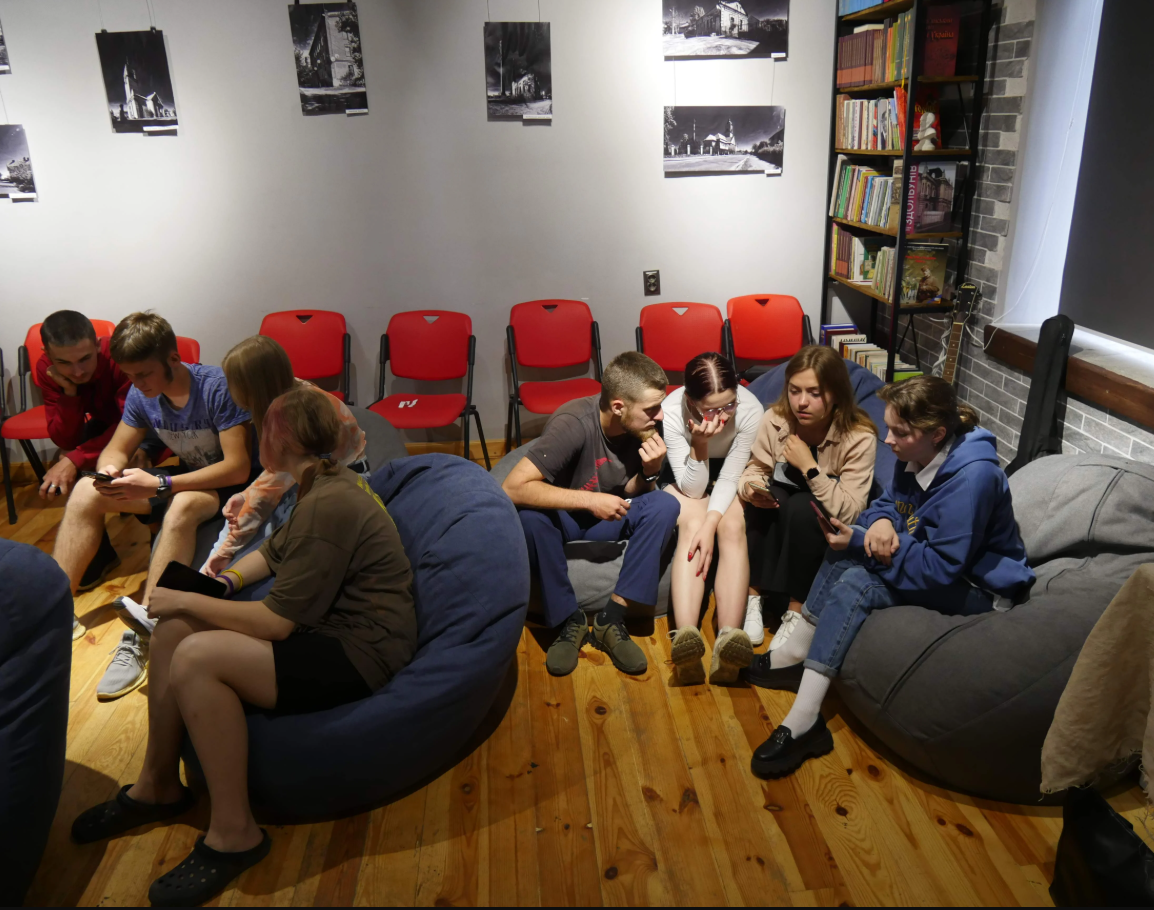
A film club opened at the Local History Museum in Zdolbuniv.
Reprinted from Zaxid.ned.
The Local History Museum in Zdolbuniv, Rivne Region, is one of the newest in Ukraine. Its history began only ten years ago, when local historian and ethnographer Oleh Tyshchenko gathered a team of volunteers to clean the building that would later host the museum.
"Our museum is quite unusual for a local history museum — not only because of its recent opening. The building itself presents a significant challenge for reinterpretation. Constructed in 1903, it originally served as an imperial gendarmerie headquarters with detention cells. In essence, it functioned as a police department with an extensive complex of prison cells. This role continued until 1954. The building was closely associated with violence under various authorities and regimes — Polish, Soviet, the Third Reich, and once again Soviet," says the institution's director, Oleksandr Chyzhevskyi.

Oleksandr Chyzhevskyi with the viewers during a film discussion
In subsequent years, the building housed an ambulance station, a dental clinic, and a branch of the State Security Service of Ukraine. For a long period, however, it stood abandoned and gradually turned into a dumping ground. Cleaning it out and removing all the debris was no easy task. It took several years of dedicated effort by local activists and volunteers. Yet the scale of their work is truly impressive: over the course of ten years, the museum team removed 470 tonnes of waste — enough to completely fill eleven railway cars. The cleared building is now gradually being transformed by this team of enthusiasts into the museum of their dreams.
Oleksandr Chyzhevskyi takes pride in the fact that the Local History Museum in Zdolbuniv has already become a genuine “magnet” for young people. A team of specialists and local activists has formed a volunteer community that supports the museum’s life and development.
“Uniting people around the museum is our core mission. I firmly believe that a museum is alive only when it is filled with people, especially youths and children. Otherwise, it’s nothing more than a collection of unwanted items,” says the director. “We could create a perfect, state-of-the-art European-style space with impressive technologies, but without people, it would be just a beautiful warehouse. That’s why we are constantly thinking of ways to attract new visitors.”
One of the team’s out-of-the-box initiatives was the opening of the documentary film club “Ne morhay” (Don’t Blink), established in 2023 as part of the DOCU/CLUB Network supported by the NGO Docudays. The idea came to Oleksandr and his like-minded colleagues after learning about the experiences of other museums all over Ukraine.
“We saw how the network operates and realized that we also needed a film club at our museum. Still, we hesitated, unsure whether we could successfully implement the idea in our town. Eventually, we held a pilot screening with a film club from Rivne, completed the necessary training, and got started. There has never been anything like this in Zdolbuniv before. Our town may be small, but among its 32,000 residents, there are certainly people interested in serious documentary films on human rights,” the director explains.

The debris that volunteers had to clean
Oleksandr Chyzhevskyi, who became the moderator of the “Don’t Blink” film club, was aware that promoting this new initiative would require effort, since locals were not accustomed to documentary films. But the effort proved worthwhile: film discussions cultivate the ability to listen and respect differing opinions and help create a new culture of dialogue and open discussion among viewers on issues that are important and sometimes painful for the community.
“We launched the film club, and it was the right decision,” the moderator admits. “Our idea worked. We can already see that there is a demand for documentary films within the community. There is a group of people who not only want to watch documentaries, but are even more eager to discuss them. People are genuinely interested in engaging with one another on meaningful topics. It turns out that the film club provides them with exactly that opportunity.”
The Local History Museum in Zdolbuniv actively employs the “living library” format in its work. The museum tells the story of the region through the personal stories of local residents — an approach that makes the information more relatable and accessible to visitors. It has also become clear that documentary films help hear lost or forgotten voices.
Oleksandr Chyzhevskyi shares: “We began with documentary films about the Holocaust and events of the Second World War. Although we were not yet entirely familiar with the functioning of a film club, we did understand how history works and how it can be discussed. The film Voiceless, produced by the NGO After Silence, became a hit at our screenings. Its creators are our long-standing partners and friends who have recorded many oral histories here in Zdolbuniv. A significant portion of their archive has been integrated into our museum’s exhibition. As a result, viewers are deeply engaged in the post-screening discussions. What they see on screen prompts them to reflect on the causes of genocide and on mechanisms to prevent such tragedies from repeating themselves.”
Exchange with ideas, reflection on the causes of tragic chapters in modern history, and search for mutual support and like-minded individuals are what draws Zdolbuniv residents to the film club.

A film discussion at the film club
“We receive numerous requests from viewers for films about the Russo-Ukrainian war, about volunteering, and the Revolution of Dignity. We don’t avoid these topics, even though discussing them can be extremely difficult — this is the history we are living through right now, and it is deeply painful for us,” Oleksandr shares. “Perhaps the most emotionally challenging screening for us was 20 Days in Mariupol, especially considering that some of the viewers were IDPs from Mariupol. But a film club has an advantage over a regular screening at cinemas: it gives people space to express their emotions and process painful topics. At times, it even feels like a session with a psychologist. And these, in my view, are the most meaningful encounters.”
This atmosphere yields additional, unexpected outcomes: people grow closer, get to know their neighbors, and make friends. This is especially important for newcomers to the community.
“Not long ago, we had a truly moving experience. We were watching the film Jamala’s Struggle and met a Crimean Tatar family at the screening. They are an older couple who left Crimea after the annexation, moved to Mariupol, and since 2022 have been living in Zdolbuniv. Sadly, we hadn’t known about them before. But after the screening, they suddenly began to sing a Crimean Tatar song. It was incredibly touching. People start truly discovering one another,” the film club moderator recalls.
The film club at the Zdolbuniv Local History Museum is expanding rapidly. As of today, it already has three moderators. According to the museum’s director, this is necessary to keep up with the growing schedule of screenings: “I know that some DOCU/CLUB network film clubs take their screenings to schools and universities. We don’t do that — all of our events take place within the walls of the museum. We have a dedicated space, high-quality equipment, comfortable chairs, and we offer tea and biscuits — everything is set up for a quality viewing experience. Sometimes we watch a full-length film that runs for an hour and a half, and then we discuss it for another two or even three hours. People are happy to spend half the day at the museum.”
These efforts are clearly fruitful. The film club has already formed a group of fans. The organizers are especially pleased that many of them are active members of the local community.
“Among our regular visitors are teachers, civil society activists, and engaged young people. They range in age from 14 to 45 and are all individuals with strong civic values. For them, it’s a great opportunity to gather, talk about current issues in the city, and brainstorm shared initiatives. We’ve already become a place of community gathering. I am convinced this is beneficial for the future of Zdolbuniv,” the museum director affirms.
The museum’s film club is opening new opportunities for the city’s high schoolers. Involving educational institutions in screenings of documentaries about human rights has become a strategic focus of the museum’s work. Firstly, the film club helps children develop a taste for documentary cinema and learn how to engage with it critically. Secondly, it provides a space where they can discuss topics that are often lacking in the school curriculum. And ultimately, children tend to perceive new information more eagerly in the stimulating environment of the museum.
“We discuss with them bullying and cyberbullying, war, activism, and gender equality,” says Oleksandr. “Gradually, we are helping them get used to watching documentaries, because today’s children lose focus very quickly. But here, at the film club, they are engaged, watching a film, having a conversation, and enjoying some tea together. It’s nothing like a regular class, yet in this format, they learn a lot of important information without even realizing it. We’re as open as possible to all topics because we understand it’s better to discuss them with young people in a safe space than to hope someone else will.”
The young and dedicated team of the Zdolbuniv Local History Museum is unstoppable. They are now thinking about ways of engaging pensioners in the screenings.
“We would love to engage them more actively, as their life and professional experience is invaluable for the development of our city,” explains Oleksandr Chyzhevskyi. He adds, “In effect, our film club is cultivating a new cultural practice in Zdolbuniv — a culture of documentary film viewing. Our work is having an impact on people, meaning it is shaping our future as well.”
Title photo: the DOCU/CLUB Network archive
Photos from Oleksandr Chyzhevskyi’s archive
The development of the DOCU/CLUB Network is funded by the Embassy of Sweden in Ukraine and the National Endowment for Democracy (NED).
The opinions, conclusions or recommendations do not necessarily reflect the views of respective governments or charitable organizations of these countries. The author(s) of this publication are solely responsible for its content.



